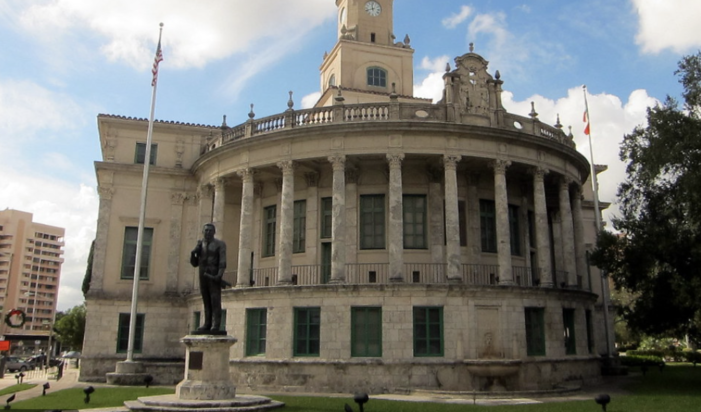Wow. Thank you good people of the Gables Good Government Committee. They sent questions to all six Coral Gables commission candidates and got specific answers from all — well almost specific, and almost all.
Rip is gonna be Rip. And Ivette Arango O’Doski found ways to answer questions without really answering questions. Which means she’s already a politician.
But the questions were relevant and touched on almost every issue facing the City Beautiful. Ladra was surprised there was no public safety or annexation questions.
But the questions were relevant and touched on almost every issue facing the City Beautiful. This provides voters with a basic outline of the candidates’ positions. So does the forum hosted by the Coral Gables Chamber of Commerce, which was poorly attended but recorded on video so voters can see it at home.
In Group 4, we have Ivette Arango O’Doski, a designer by birth and lobbyist by education, permit expediter and mental health professional Melissa Castro, perennial candidate and downtown property owner Jackson “Rip” Holmes and investment consultant Sean Patrick McGrover.
Read related: Coral Gables Commission candidates provide first glimpse at PTA forum
In Group 5, we have Alex Bucelo, a baby-faced attorney who lost two years ago against Kirk Menendez, and Ariel Fernandez, longtime activist and publisher of Gables Insider, which some may see as a conflict of interest, who lost an election in 2015 to Jeannett Slesnick.
These answers are in their own words with no edits by Ladra:
Q. Why are you running? What is the most important issue you would address or advocate for if elected?
Arango O’Doski: My roots in Coral Gables are deep. I am running as a member of this community that has lived in Coral Gables for over 30 years. I want to keep Coral Gables as a community and would like to use my experience in advocating for issues that matter to all of us to ensure that our city is a place where our children will want to stay and grow their own families. I want to support our local businesses and protect our neighborhoods by supporting police and fire and opposing overdevelopment that erodes the character and culture of our residential areas.
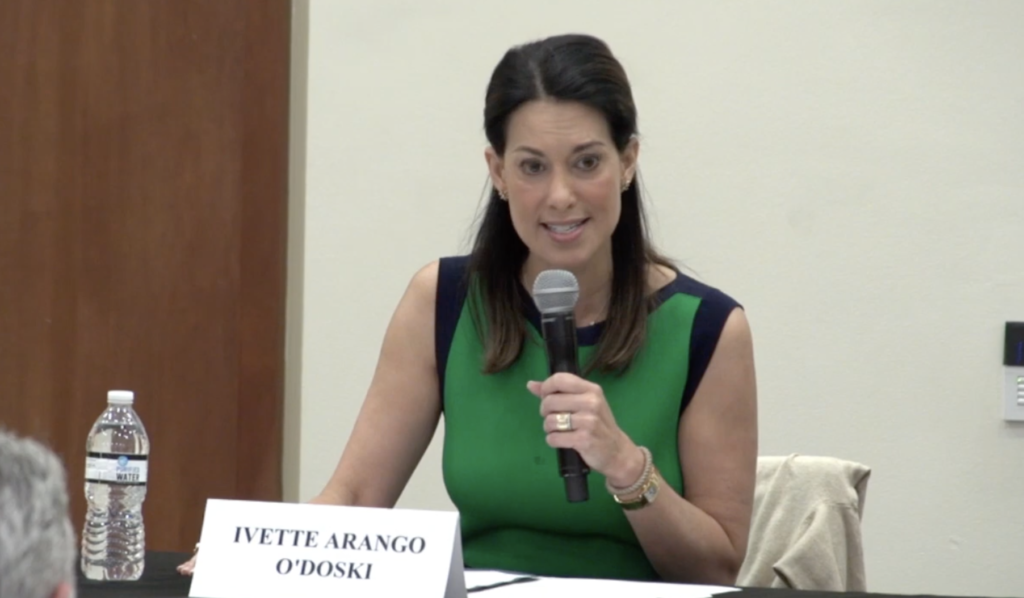
Castro: I am running to serve the residents of Coral Gables due to the passion I have to make our community the best in the nation and the desire to make a difference. I also possess unique skills and experiences that could help improve the lives of many residents here in the Gables. My presence on the Coral Gables Commission will help bring new perspectives and ideas to the table. As someone who is actively involved in my community, I know that residents are eager to see a bigger change. The most important issue I would advocate for is improving the Permitting Department, in which I know I can put into effect. If elected, I can be a fresh voice with experience to advocate and make the changes all residents urge to see.
Holmes: My main issue is overdevelopment. Citizens United makes it legal for developers to buy City Hall. The developers donate 4 times more to candidates than all taxpayers combined. As a result, we no longer have a democracy, but instead a developer-ocracy. Our best way of fighting this is to amend the City Charter to require voter- referendum approval of any major development, as the City of Miami Beach and the City of Key Biscayne have done.
McGrover: I am running because I believe we need more diversity on our board. Presently, all seats are held by attorneys, and I feel most, if not all attorneys look at issues the same way. My background is in building businesses and investing, and I believe I can look at issues differently that will add value to decisions. The most important issue I see for our city is the oncoming recession that is going to heavily impact the community if we are not proactive in cutting costs, lowering our debts, and putting together a plan to increase revenues through attracting large businesses to our community.
Bucelo: I am running because I want to make sure that the character and charm of our community is maintained, our community remains safe, and taxes remain low without reducing city services. I want Coral Gables to be more environmentally resilient and I will always side with my neighbors in opposition to large-scale developments. As a matter of fact, while others talk, I am the only candidate running for City Commission who has actually voted against large-scale developments.
Fernandez: I am running with the goal of making residents the priority in Coral Gables, not an afterthought. For many years our focus has been shifted away from those the Commission and staff should serve. My goal as Commissioner is to ensure we make the needs of residents the priority.
Q. In what ways do you think the current City administration could better serve the citizens of Coral Gables, and how should the incoming administration put those ideas into action?
Arango O’Doski: I am honored to have the endorsements from Mayor Lago and all the current elected commissioners. I believe that everyone on that dais today carries the best interest of the city at heart and are passionate about the issues that they deliberate over. They may not always agree and sometimes those disagreements get the better of them. In that sense we should all do better. We are stronger together as a community that can engage each other respectfully to find solutions that are better and even more innovative than the solutions we come up with on our own.
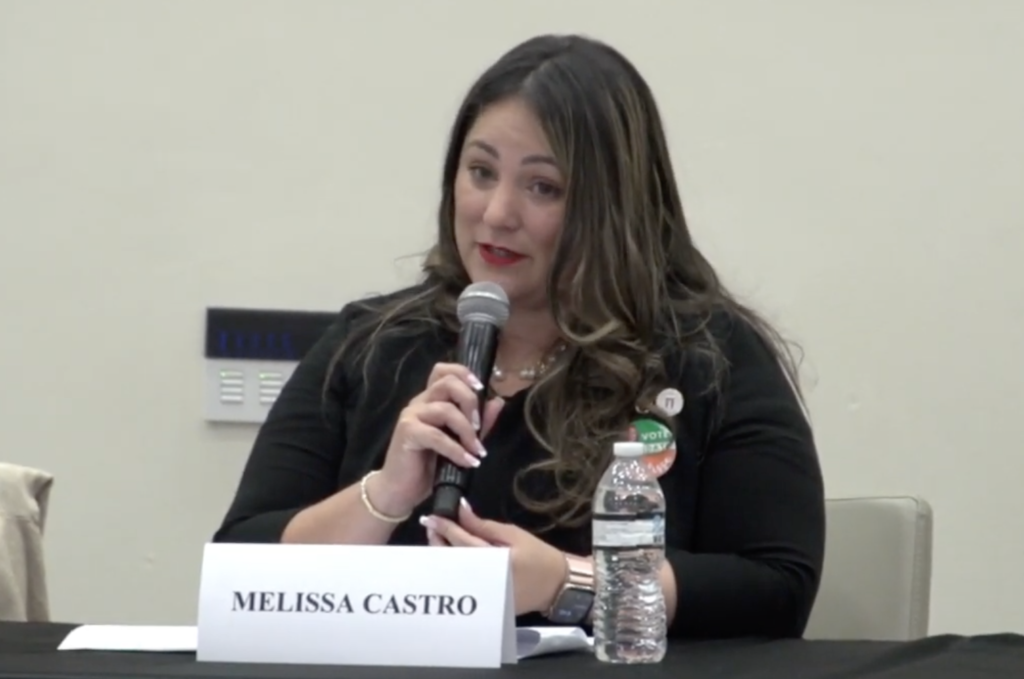
Castro: Communication: The City administration can improve communication with residents by providing more timely and transparent information. This can include regular updates on city projects, new developments, and initiatives, as well as holding various public meetings to gather resident input. Community Engagement and Involvement: Encouraging residents to participate in decision-making processes. I would also support opportunities for residents to volunteer and participate in local events. User-friendly technology: Provide applications that are user-friendly and explore the idea of extended hours on an as-needed basis.
Holmes: Please see the answer above.
McGrover: The current administration could serve our community better by realizing that the economy is about to be impacted tremendously by an oncoming recession. To protect our community we need to recognize this, be proactive, and start planning to strengthen our city’s financials by cutting debt, canceling large capital expenditures for the next twelve to twenty-four months, and finding ways to lessen city expenses over the next two years.
Read related: Coral Gables Mayor Vince Lago wins automatic re-election with no challenge
Bucelo: If elected, I would like to have a conversation at the city commission during my first 100 days to ensure we can leverage the power of technology to help our staff and our residents navigate the challenge that permitting can be. For example, if elected, I will propose that the Planning Department sets up dedicated Zoom appointments – say 10/15 minutes long – twice a week, first thing in the morning, to address simple remarks or comments without having to go to the building. If we are all working and connecting via Zoom, why can’t we use the platform to expedite this process? Another idea is to have the Department implement QR codes for each permit so that residents can look up the status of their plans by simply using their phone and scanning the QR code. No more complicated websites and searching for plans. Technology makes our life easy – from checking our homes to setting the temperature in our house – we should use it to make our city better as well.
Fernandez: The Administration must improve its customer service. There is no reason why resident emails and calls should go unanswered by staff, including the City Manager. As Commissioner, I would focus my efforts on ensuring residents are being heard and their needs are being addressed.
Q. What actions would you propose that the City of Coral Gables take to control and reduce these and other climate change contributors?
Arango-O’Doski: Government at every level wants to increase electric vehicles and achieve net zero carbon emissions. The recycling rate of our county, however, is at 19%, one of the lowest in the state. We need to do better. Our waste-to energy facility in Miami-Dade County was destroyed by fire and we know how damaging petroleum products such as plastics are to our environment, especially our waters. Coral Gables waterways feed into Biscayne Bay. There is legislation proposed in Tallahassee to help our environment by allowing us to grant dollars to clean up our waters. There also is legislation proposed that would allow our city to use grant dollars for resiliency infrastructure. We need to connect with these initiatives that not only provide solutions but provide funding. Our city government should encourage our residents to be good stewards of the environment and we need to message ways that anyone, regardless of age, can help.
Castro: I would like to explore the possibilities of electric trolleys and/or Freebees. As I’ve stated many times before, implementing the 3 R’s (Reuse, Reduce, and Recycle) in schools is very important. Overall, the City of Coral Gables can take multiple approaches to reducing climate change contributors by implementing policies that encourage energy efficiency, public transportation, tree canopy coverage, recycling, water conservation, and renewable energy.
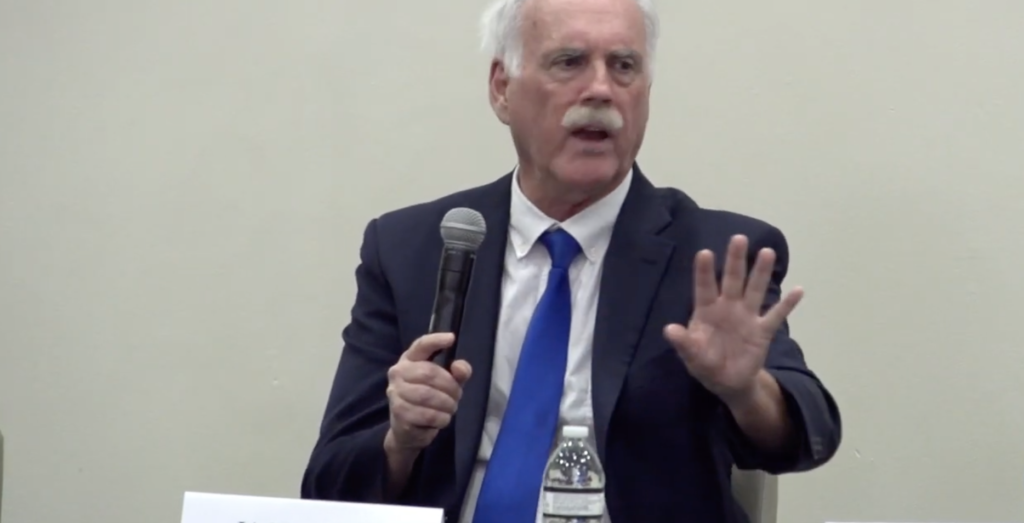
Holmes: I advocate doing an experiment to see if heavy seawater free energy works. The History Channel has successfully tested Tesla’s free energy theory and IT WORKS. We are facing sea-level rise threatening to drown Coral Gables within 100 years, destroying all we have. Eugene Mallove of MIT says hundreds of experiments have verified a net energy gain running electricity through heavy seawater — seawater containing deuterium — whereby, say, you run an electric current of 5 amperes into one end of a lab container, and somehow get 7.5 amperes out the other end. Multiplying this free energy thousands of times, we no longer need petroleum, and we thereby end sea-level rise. The experiment costs about $10,000. What do we have to lose?!
McGrover: I am a huge proponent of alternative energy, such as solar and electric vehicles. However, I am not entirely convinced that we have a climate change issue. The reason I say this is because as a child the government and scientists were pushing the narrative of global warming, and in the past decade they have pivoted from global warming to climate change – all without any solutions. The reason there are no solutions is there is no global warming and while I believe there is climate change, it’s not as impactful as the government and narrative suggest. Having said that, technology and innovation is only going to benefit all and I am in favor of alternative methods.
Read related: Coral Gables Vince Lago is running slate of candidates in April election
Bucelo: First, I have to commend Mayor Lago and the City Commission for leading the way over the past few years in making sure our city fleet starts making the transformation from fossil fuels to electric. As a matter of fact, the City of Coral Gables has the largest electric vehicle fleet of any municipality in the state of Florida. Recently, I saw the Mayor introduce legislation asking the city’s police department to purchase an electric police vehicle this year. If elected, I would support this effort and work with the Mayor to find ways to expedite it.
Fernandez: The City has been a leader on this front for many years and I would seek to continue this. We have a Chief Sustainability Officer who is actively seeking ways to reduce our carbon footprint. Our City has a major issue that will be coming to the forefront in the next few years: Septic to Sewer conversion. This is a crucial conversion to protect our environment and Biscayne Bay. The cost will be extremely high and we must begin working with the State and Federal government to seek the necessary funding.
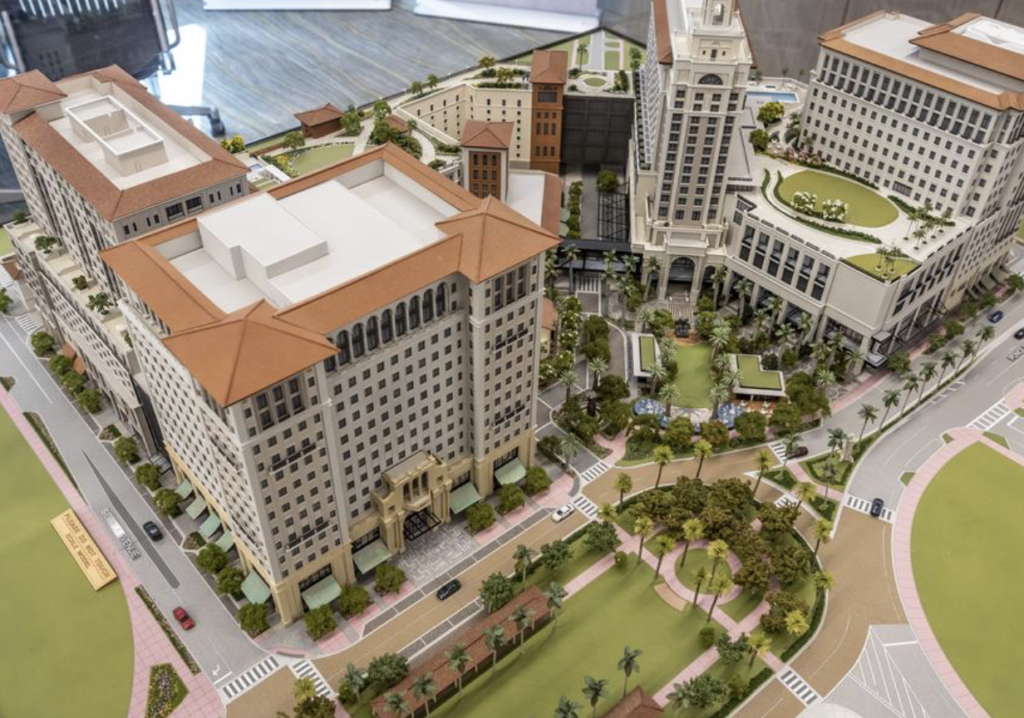
Q. Where do you stand on future development and the concerns that residents have raised in opposition? Do you think the city needs more development or more restrictions on development? Explain why.
Arango O’Doski: Coral Gables is growing at a seemingly fast pace. I think when it comes to growth residents are becoming increasingly concerned. Some development makes sense because it supports our downtown and local businesses. What is missing and contributes to the uncertainty is a roadmap and transparent communications about what is coming online, what that will look like, and where it will stop.
Castro: As a longtime resident, I agree with the valid concerns that many residents have raised regarding the impact of new development, such as increased traffic congestion, strain on infrastructure, and changes to the city’s aesthetic and historic character. In my opinion, the City of Coral Gables should strive for healthy development that meets the needs of both residents and small businesses while preserving the city’s unique character. This requires a thoughtful and balanced approach that carefully considers the impacts of new development on the community and the environment. The most important thing to me is that the City should listen to residents’ concerns, involve them in the decision-making process, and that it does not come at the community’s expense. This means holding public hearings, engaging with residents and community groups, and incorporating feedback into development plans. The City should carefully evaluate each proposed development project on a case-by-case basis, taking into account the potential benefits and drawbacks.
Holmes: Please see my answer to the first question.
Read related: Coral Gables Mayor Vince Lago may have conflict of interest in Little Gables
McGrover: I believe development is a positive for our community; however, I agree that over-development would not benefit the residents of Coral Gables. Which is why I believe we must stay in front of any development going forward. We have the opportunity to create a phenomenal community with unique designs and characteristics. Presently, the current and proposed developments don’t even exceed 7.5% of the current population for new residents, therefore I think there is room for properly planned growth in our community. I am excited about the future of Coral Gables, and I am excited that there is an interest in development that the city can lead to build a better tomorrow for Coral Gables.
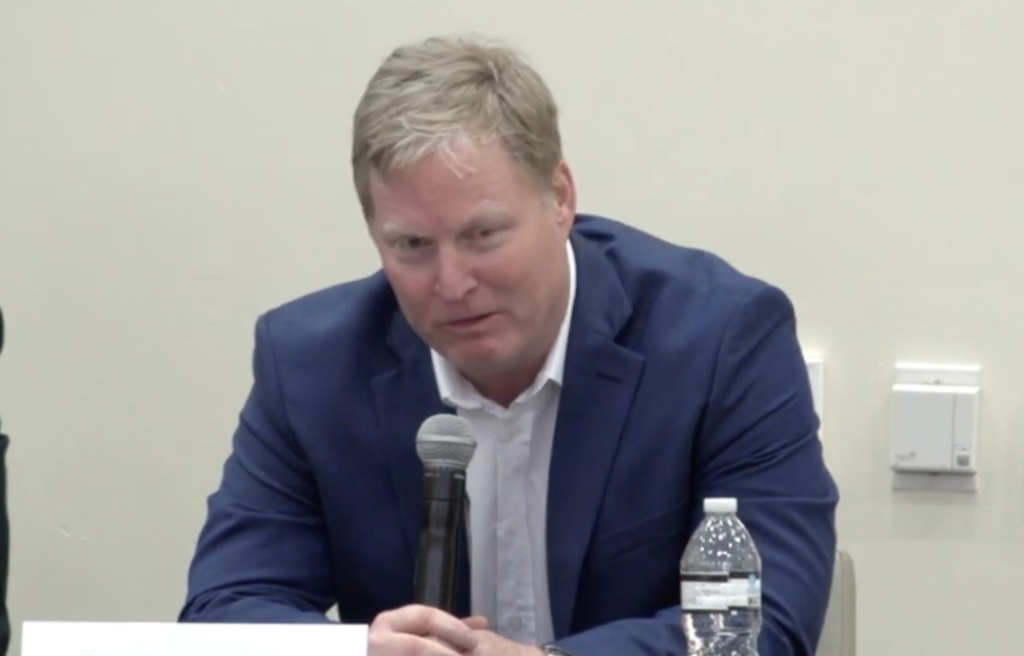
Bucelo: I am the only candidate running for commission across both groups that has served on the city’s planning and zoning board. My position on the city’s overall development is quite straightforward: I want developers to adhere to the zoning code. If anyone wants to deviate from the code, then we need significant public input and public benefits. While other candidates talk, I am the only person running for city commission who has voted against the most controversial project in Coral Gables recent history – the project on Ponce and University that was looking for a massive up zoning from 90 feet (allowed by code) to 170 feet. I listened to the residents and stood strong against it. Again, while others talked, I actually voted.
Fernandez: The solution to this problem is simple, enforce our Zoning Code. We must stop the special favors being given to the developers who are funding candidate campaigns. If a developer is allowed to build a 77 foot-tall building, they should be capped at 77 feet. Giving concessions has placed us in the overdevelopment crisis we are in today. I am the only candidate in this race who has taken $0 from developers. I will be a strong voice opposing the special favors and for enforcing the Zoning Code.
Q. The Coral Gables Commission voted in favor of an updated zoning code in 2021 after several years of discussion among the residents, the City administration and the City Commission. What reasons would cause you to consider supporting a zoning code exemption or amendment to alter the code for a developer’s site proposal?
Arango O’Doski: I understand that the decisions I make from the dais create precedent. If our government is to be well run and provide the highest level of service to our residents, we must follow the code. Exemptions to the code should not be the norm. There may be factors that present opportunities for our consideration and debate but those occasions should be limited and tied to specific and articulated reasons. These opportunities may include partnerships to enhance our infrastructure, add valuable open green spaces, parks, expansion of sidewalks. We do not want development, however, to continue bleeding into our residential neighborhoods.
Castro: I believe that there should not be zoning code exemptions — especially for developers. The code is the code and the developer knew that before purchasing the property. The city of Coral Gables should solely focus on the residents’ quality of life. However, in some cases, unforeseen circumstances may arise that necessitate a zoning code exemption or amendment, such as changes in consequence to environmental issues on the property.
Holmes: None.
McGrover: If the developer were to follow a unique Mediterranean style that gives a cultural impact to our community, I can see being a little bit flexible on the development, not to increase the size, but to add character to the community.
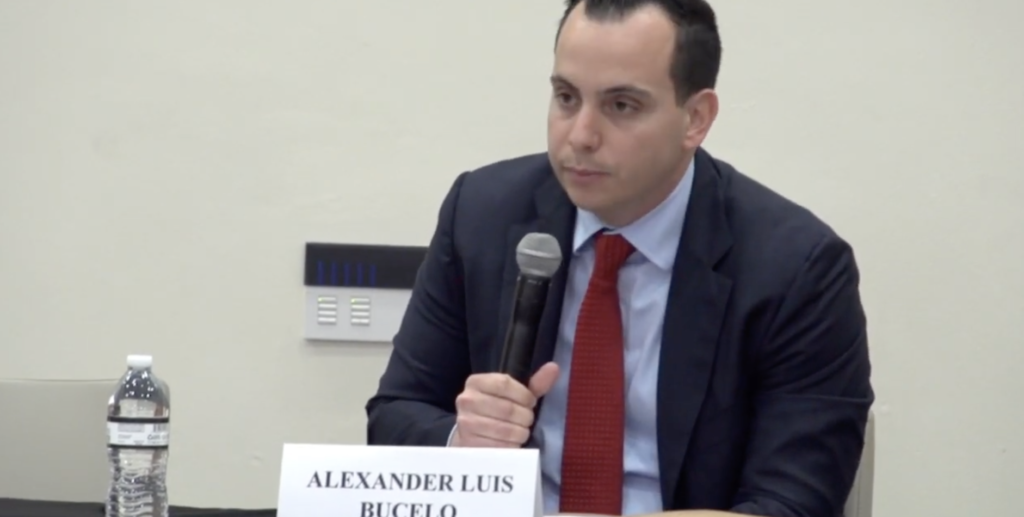
Bucelo: As I mentioned in my response to the previous questions, my position on the city’soverall development is quite straightforward: I want developers to adhere to the zoning code. If anyone wants to deviate from the code, then we need significant public input and public benefits.
Read related: Zoning code ‘mistake’ in Coral Gables could make millions for developers
Fernandez: As I stated before, we should enforce the Zoning Code. Our City has worked long and hard to create the Zoning Code we have today. Special favors to developers only create problems for our City and encroach on the privacy of residents. Developers are buying land with the expectation that the Commission will allow them to do what they want, regardless of what the Code allows. My message to developers: Coral Gables is not for sale!
Q. What initiatives are included in your strategy to improve traffic in and through the City?
Arango O’Doski: It’s important to recognize traffic issues are caused not solely by one individual municipality – which means, we will need to take a multi-governmental view of the problem. Miami-Dade County is a donor county to tax coffers, which means leaders on all levels need to do a more effective job of pulling down resources to address these issues. Additionally, we need to turn the government into a more proactive entity – instead of a reactive entity. We have to set long-term goals and be more proactive in planning for the future. We need to plan using multimodal options but that will require us to pull down dollars from federal and state.
Castro: Expand transportation demand management programs by expanding the Freebee and Trolley to residential areas. Invest in a Smart Traffic System that uses real-time data to facilitate traffic flow, help congestion, and improve safety. Improve parking management by implementing smart parking systems that help residents find open parking spaces and help cut the time spent looking for a spot.
Holmes: The Penny Sales Tax was only voted in circa 2001 on the explicit promise the money would only be used to build rapid transit traffic solutions. Instead, in The Great Recession, the County violated its explicit promise to taxpayers, and misappropriated $27 million of the $32 million collected. It only costs $14 million to put MetroRail on all our Expressways, thereby reducing traffic by at least 1/3. We need to get the money put back in the Penny Sales Tax Fund, and our traffic problems are tremendously reduced. I support Vince Lago’s lawsuit to do this, and think the City should join as a Party.
McGrover: I believe we should have flashing lights, colorful walkways, and create a department of traffic ticket officers that have the power to ticket any traffic that is exceeding the speeds or ignoring the blinking lights and signs. I think it could also be beneficial to add more signals and decrease the speeds near our schools and hospitals.
Bucelo: Traffic is at the top of the issues on voter’s minds. Our city is a pass through for thousands of vehicles every morning and afternoon during rush hour. Unfortunately, most of the major arteries traversing out city are either county or state roads, therefore, one of my main initiatives is going to be engaging the county and FDOT much more actively to work together to find ways to alleviate congestion, but also to protect residential streets from serving as overflow when traffic is backed up.
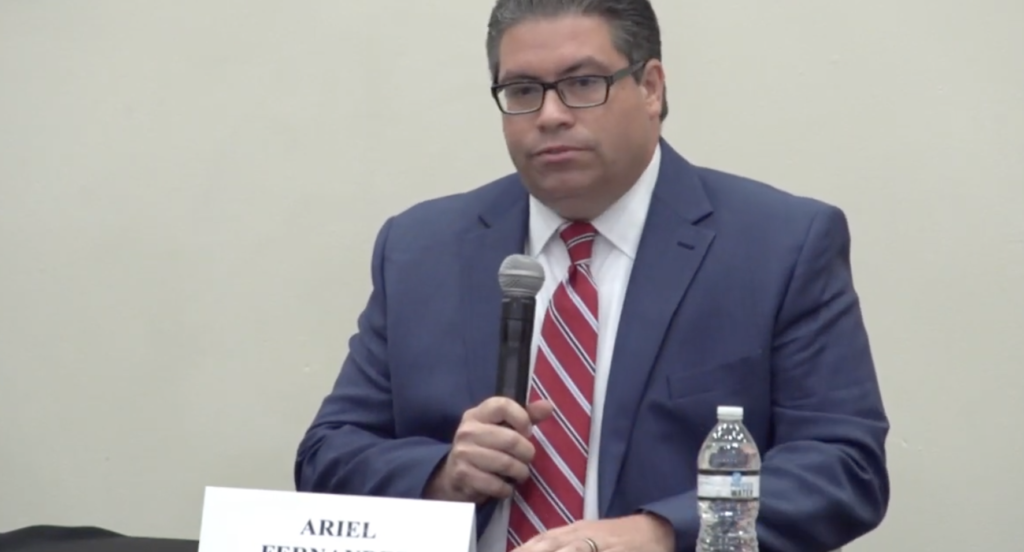
Fernandez: Reducing the rate of development is key to reducing traffic. Additionally, we must engage the County in finding solutions to the cut-through traffic on our streets. This is a direct correlation to the County’s growing traffic problems and its inability to address them. Traffic calming has helped but does not solve the problem. Residents living in our residential streets deserve better.
Q. Do you support improving safe infrastructure on roadways and rights-of-way to encourage active modes of transportation? Specifically, do you support bicycle and micro mobility (scooters) lanes or paths, expansion of the sidewalk system?
Arango O’Doski: I’m in support of giving people, including the elderly, choices for modes of transportation while encouraging people when they can to take advantage of our Freebee and Trolleys, get out and bike where it is safe, expansion of sidewalks to make it easy for pedestrians and to be inclusive of our special-needs community. We have approximately 50K residents and approximately 77K in our workforce, with a high percentage of executive white-collar talent. We have the largest cluster of multinational office and consular offices in Florida. Multimodal transportation options speak to the quality of our city. Not to mention that it provides connectivity to the heart of our central business district and cultural assets such as the Coral Gables Museum, Books & Books, our Cinema and the Coral Gables Foundation Moon Project.
Castro: Improving safe infrastructure on roadways and rights-of-way is crucial to encouraging active modes of transportation such as cycling, walking, and micromobility. Investing in safer infrastructure can help reduce congestion, improve air quality, and promote physical activity.
Holmes: Yes. SAFETY FIRST AS TO BICYCLES AND SCOOTERS. I like armadillos like on the Venetian Causeway. Unless thoroughly safe, I cannot justify sending our young people to be slaughtered on our roadways. I understand and sympathize with these alternatives to cars, but SAFETY FIRST.
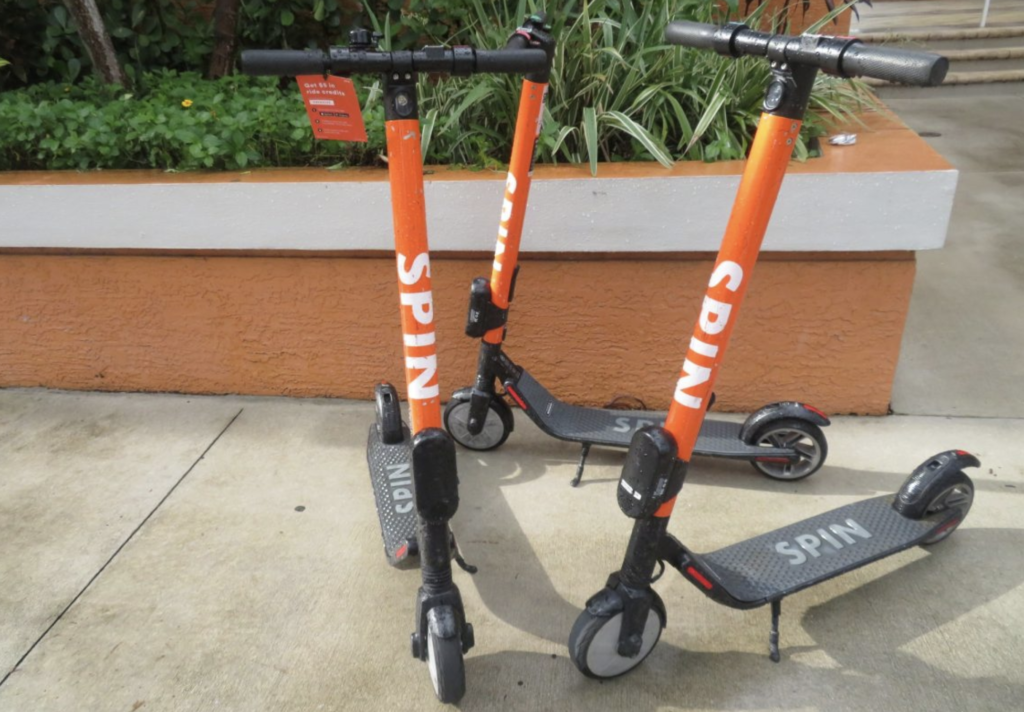
McGrover: No, I think the risk of injury is too high in our community to add more activities on our streets. I do believe we should invest in expanding and renewing our sidewalks.
Bucelo: Yes, I support micromobility. As a matter of fact, I am in support of all forms of micromobility and bicycles that will help get people out of cars and reduce greenhouse gases. But I have a concern as it pertains to residential neighborhoods. I want to make sure that residents have a say when it comes to dedicated bike lanes. If elected, I will support micromobility and ensure the residents can express their opinions on any type of dedicated lanes in their neighborhoods.
Fernandez: We must look at solutions to make our highly mobile City safer. Our sidewalks are in deep disrepair and are causing many issues. As for bike lanes, we must study the issue in each neighborhood and engage the residents to find solutions that work for each neighborhood.
Q. Do you believe that such safe infrastructure should depend on approval of contiguous property owners, or do you recognize that these improvements benefit all because they increase safety and therefore will increase alternate transportation and reduce automobile traffic?
Arango O’Doski: It is important to build consensus in matters that will affect the property rights of an individual. Our residents should feel as though they are being heard by their government and not feel like they are being forced. We make better decisions in government with the support of our community. To that end, we can all get behind the fact that our sidewalks need improvement and better connectivity. Providing access to parking is very important, but we need to support alternate modes of transportation. It needs to work, it needs to be accessible, and it needs to be efficient.
Castro: Improving safe infrastructure on roadways and rights-of-way is crucial to encouraging active modes of transportation such as cycling, walking, and micromobility. Investing in safer infrastructure can help reduce congestion, improve air quality, and promote physical activity.
Holmes: The contiguous property owners should majority approve.
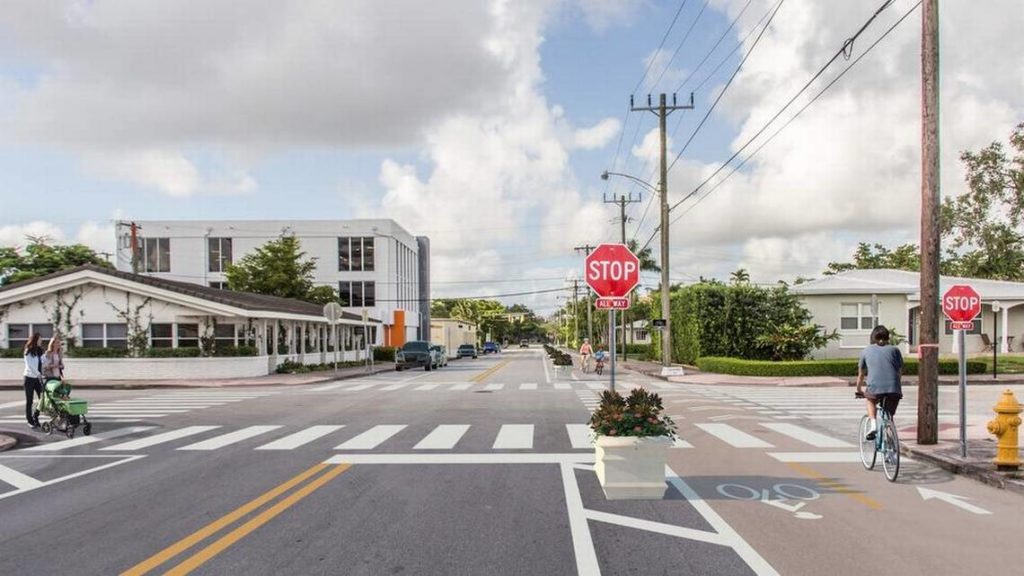
McGrover: I don’t believe during this current economic time that we should be investing the city’s capital into the infrastructure that would create more risk to pedestrians, cyclists, and scooters. We should focus on expanding our sidewalks for those uses.
Read related: Unpopular bike lanes stir rally, may be halted by Coral Gables mayor Tuesday
Bucelo: As I mentioned above, I want to make sure that residents have a say when it comes to dedicated bike lanes. If elected, I will support micromobility and ensure the residents can express their opinions on any type of dedicated lanes in their neighborhoods.
Fernandez: Community input and working on a plan that actively engages the community is crucial. We have seen the City push plans in the past without active resident participation and it has ended in major disagreement. Any plans the City makes must involve the community.
Q. When we look at your campaign finance reports after the election, what percentage will be found to have been contributed from PACs and parties outside of Miami-Dade County? Do you believe that there should be voluntary limitations on contributions outside of Miami-Dade County to candidates for Coral Gables City Commission and Mayor?
Arango-O’Doski: I believe in full transparency in contributors and reporting donations to the letter of the law. I think that we need to focus more on transparency and accountability in campaigning. I do not believe in limiting anyone’s constitutional rights in supporting a candidate that they believe in. Moving to quicker reporting of donations will allow voters to have more access to information.
Castro: When looking at my campaign finance reports, you will find that I have not received any PAC funds.
Holmes: I agree to these limitations. They are needed.
McGrover: I did not approach any PACs, nor do I have any outside organizations or corporations investing in my campaign. Regarding outside contributions, I don’t believe outside organizations should be funding candidates for a municipal election. There is no reason or need for that money to help a candidate capture a seat. We are here for the community, not outside interests.

Bucelo: The majority of my contributions are from individuals or corporations who live or do business in Coral Gables and the greater Miami Dade metropolitan area in general. I am hesitant to support any idea trying to limit political contributions based on a definition of “outside Miami-Dade” that has not been discussed or presented yet.
Fernandez: My campaign finance reports will show you $0 for developers, $0 from lobbyists and $0 from special interest groups. I am running a purely grassroots campaign. All money in my account comes from friends, family members and residents of the City of Coral Gables.
Q. Have you pledged to run a positive campaign and to avoid any negative or defamatory attacks on the character or of your opponent(s)? Will you publicly repudiate any third-party individuals or PACs who engage in negative attacks against your opponent(s) on behalf of your campaign?
Arango O’Doski: Yes.
Castro: I have pledged to run a positive campaign and will not be negative towards any other candidate. I do not condone or support negative campaigning and I am committed to solely running a positive campaign that focuses on the issues and the vision that the residents share. Addressing topics in a constructive and respectful manner is important to me because it builds trust and credibility with the residents and portrays my character.
Holmes: I have no PAC. I take the pledge, unless I must defend myself from a PAC smear, or need to point out misrepresentations.
McGrover: Yes, I will absolutely run a positive campaign. I will not directly or indirectly attack or defame any of the candidates running for the office of city commissioner. If any third party attacks or defames a candidate that supports me, I will publicly respond and distance myself from whatever organization or individual is doing that.
Bucelo: I have signed the city and the chamber’s pledge.
Fernandez: I have pledged and have continued to focus all my campaign efforts on showing what I stand for and how I differentiate myself from my opponent when it comes to the issues and our campaign finances. Unlike my opponent, I do not have an affiliated PAC. My money and all communications from my campaign will continue to be direct from me, with my name attached.
Q. What do you think can be done to improve trust and participation in local government? Do you have ideas on how to improve civil discourse in our community regarding interactions between City Hall and the public?
Arango O’Doski: Government can be disconnected from the general public. Not everyone wants to spend their time at City Hall but the disconnect breeds a lack of trust. For that reason, I want to be a commissioner that will bring City Hall to their doorstep. Mobile City Hall hours, where leaders from our community can come to neighborhoods and local organizations to bring the opportunity to find solutions right to their door, instead of them having to travel to City Hall.
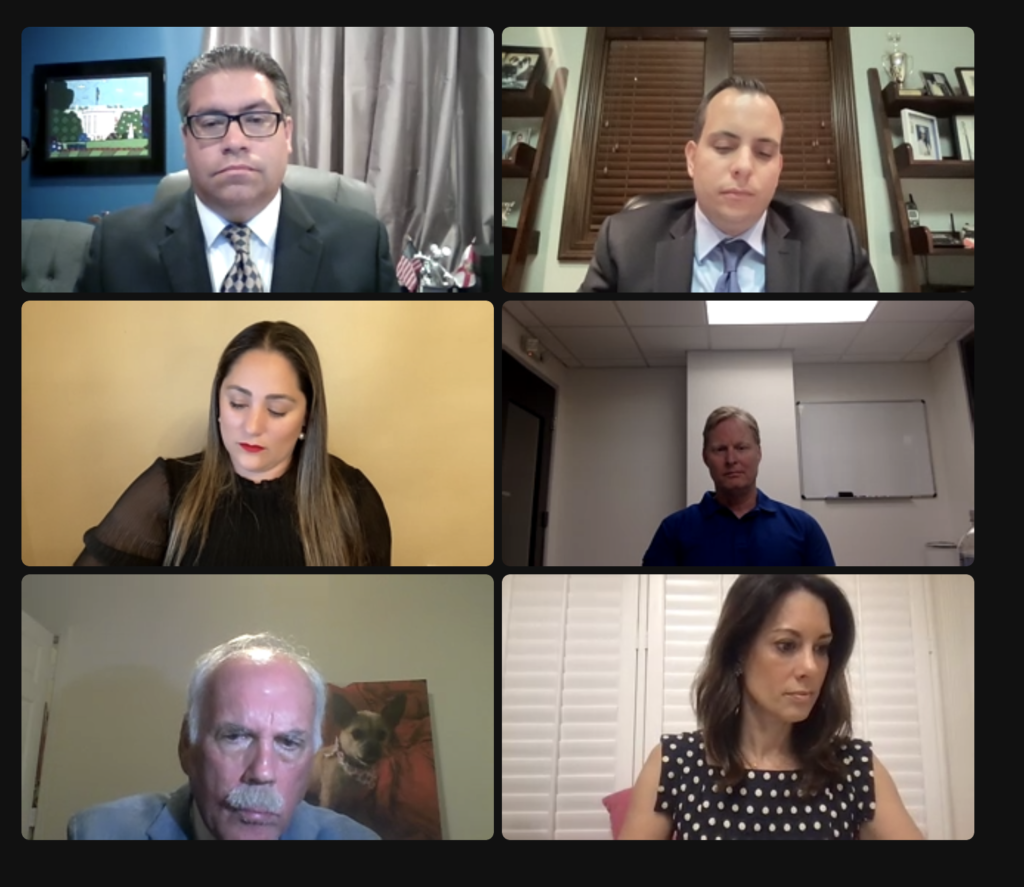
Castro: Improve transparency and enhance communication with residents, making information about City operations, budgets, and decisions easily understandable to residents (no acronyms). This can include regularly publishing reports, holding public meetings, and sharing information on the new digital kiosk installed in downtown Coral Gables. Newsletters and online forums could also help spread useful information and gather feedback from the public. The City can promote civil discourse by establishing clear guidelines for respectful communication during public meetings that have to be acknowledged and signed prior to entering the meeting, by agreeing that if guidelines are not followed the offender would be removed from the environment. We can also provide training for City staff and elected officials on how to engage in constructive and respectful dialogue with the public.
Holmes: Please see my answer to the first question. The Comments section of City Commission meetings is excellent.
McGrover: We need more interaction through continuity in communication, whether it be direct mail, email marketing, or radio ads to continuously keep our community informed. Secondly, a community’s response is imperative in running leadership with values that our citizens largely share through means of open forums where our community can respond to issues, offer solutions, and/or state their concerns. I feel that the community does not presently have a strong relationship with our city officials, and I would like to change that. I would like to be the candidate that the community can always count on and have constant open communication with through call, text, email, and open-door policy, and I want to do this to build a better tomorrow for Coral Gables.
Bucelo: I believe Mayor Lago’s leadership on openness and transparency is commendable and I think that, if elected, I would like to work to implement a system similar to the Mayor’s to interact and listen to residents regularly.
Fernandez: One of the biggest concerns residents share is the lack of trust in public officials who make promises and do not come through when elected. I share their concern and have personally been affected by the deceitful nature of candidates who have no intention to live up to their commitments. The only thing I can do is to live up to the promises I have made during this campaign, if elected.
Want to ask them your own questions or follow up on their answers? There’s nothing like hearing it straight from the horse’s mouth, though you might want to set aside extra time for Rip. Here’s where you can find more information and contact the candidates.
IVETTE ARANGO O’DOSKI
- Website: www.ivette4coralgables.com
- Email: Ivette@ivetteodoski.com
- Phone: (305) 632-6452
MELISSA CASTRO
- Website: www.VoteMelissa4Gables.com
- Email: Info@VoteMelissa4Gables.com
- Phone: (786) 567-2614
JACKSON “RIP” HOLMES
- Website: www.ripholmes.com
- Email: rip.holmes@yahoo.com
- Phone: 305-338-5000
SEAN MCGROVER
- Website: www.vote4mcgrover.com
- Email: Sean@mcgroverfunding.com
- Phone: (407) 765-0341
ALEX BUCELO
- Website: www.AlexBucelo.com
- Email: Alex@alexbucelo.com
- Phone: (305) 794-2291
ARIEL FERNANDEZ
- Website: www.voteariel.com
- Email: arielfernandez@voteariel.com
- Phone: (305) 684-3874
The Gables Good Government (GGG) Committee is a non-profit organized by former Mayor Don Slesnick to “support issues and causes that preserve and improve the quality of life in Coral Gables and promote the effective and efficient management of its government.” While the group may support or oppose initiatives and referendum questions, it will not endorse or oppose candidates for office. Memberships are available.

